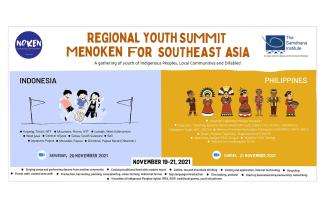The finest hinabol (Binukid name for handwoven Abaca fiber) are woven into Kamuyot, a type of backpack or slingbag used to carry items and used as an offering to Magbabaya or a peace offering during conflicts with other nearby tribes. Kamuyot is a handloomed product that is used by the Higaonon tribe. Both the men and women carry a range of commodities and items using the bag.
Traditional abaca weaving is one of the oldest crafts of the indigenous peoples in Northern Mindanao, and has been passed down from one generation to another.
The kamuyot is the icon that the indigenous youth from the Higaonon, Talaandig and Bukidnon Tribes chose to represent their participation in the Regional Youth Noken, or the gathering of young indigenous peoples in the Philippines and in Indonesia. A noken is an indigenous woven bag in Indonesia, and the term “menoken” has been adopted in Samdhana Institute to refer to the series of gatherings with Indigenous and local communities wherein exchanges of knowledge, values, community products, experiences and lessons are vibrantly taking place.
The Regional Youth Noken is organized to provide opportunity to reconnect, especially after the long months of the COVID-19 pandemic lockdown. It aims to build or renew the social connections between various Indigenous youth groups through an exchange of culture, experiences, concerns and plans.
There will be seven simultaneous ‘nokening’ taking place on 19th-21st November in the Philippines, while there will be nine communities in Indonesia. In the Philippines, the nokening sites are in Calamianes (North Palawan) with the Calamian Tagbanwa, in Northern Mindanao with Higaonon, Talaandig, Bukidnon and Menuvu tribes, in Kidapawan with the B’laan, Manobo Tagabawa, and Maguindanaon, in Surigao with the Mamanwa and Badjao, in Tandag with the Manobo, and in Maguindanao with the Teduray and Lambangian tribes. In Indonesia, the nokening will happen in the regions: Central Java, West Java, South Sulawesi, West Kalimantan, Bali, Jayapura, Merauke, East Nusa Tenggara, and Flores.
Each nokening site have their own unique program, and will cover the topics which the youth working groups have identified, such as Indigenous Peoples rights, environment and climate, culture and tradition, the IP youth concerns and agenda, traditional foods, coding application and internet technology, recycling, coral planting, millennial farming, sign language, filmmaking, and entrepreneurship. Cultural dances, songs and games will be prepared by the youth participants. This nokening movement aims to leave no one behind. Sign language interpreters in Indonesia will accompany the deaf nokeners. Resti, one of the blind baristas from West Java, will lead the Blind Adventure, where the nokeners will explore the camp site with their eyes covered. This activity aims to stimulate other sensory organs, other than our eyes, and demonstrate that people have different abilities despite physical differences. This is the way we build solidarity, through nokening - support each other with love, without any social barriers. The young nokeners will be accompanied by their Elders, who will also share their wisdom and oral history. The seven nokening sites in the Philippine and nine in Indonesia will have a national interaction respectively, online to bring the participants together. An online regional interaction will then follow with all the participants from both countries.
The Philippines noken is being co-organized by: Paraigu Kawataan (Calamianes); Anak ng Tribu Higaunen-Talaandig, KAGDUMA Youth, Sinabuwa ho mga Basbasenen Higaonon ta Cagayan de Oro, Dulangan Youth Group, MAMACILA Youth, Kalanawan Youth, Man-ai Indigenous Youth Community, and Bukidnon Indigenous Cultural Communities Ancestral Domain; (Bukidnon and Misamis Oriental); Unified Kirinteken Ilantungon Menuvu Tribal Council Youth, Serukadang Menuvu Tribal Organization, and Neumpong ne Memenguhen te Serukadang (Southern Bukidnon); Inter-Cultural Organizations Network for Solidarity and Peace (Kidapawan); Diocesan Social Action Center of Surigao; Diocesan Social Action Center of Tandag; and Teduray, Lambangian Youth and Students Association (Maguindanao).
In Indonesia, nokening is co-organized with communities from Community Association of Activists Care for Children's Rights (PAPHA) Maumere, East Nusa Tenggara; Tanah Timor Community East Nusa Tenggara; Tabi community, Papua; Deaf coffee community, east Java; Animha Community Papua; Children with different abilities movement (GPAD), Central Java; Patamuan Talino Cultural School Community, West Kalimantan; Patalasang community, Gowa South Sulawesi; Tamblingan Indigenous Community, Bali; and Domberai Community, Papua. Nokening regional youth summit is supported by The Samdhana Institute, Kaoem Telapak, Bogor and Yayasan Rumah Solusi Beta Indonesia, Kupang. ###




